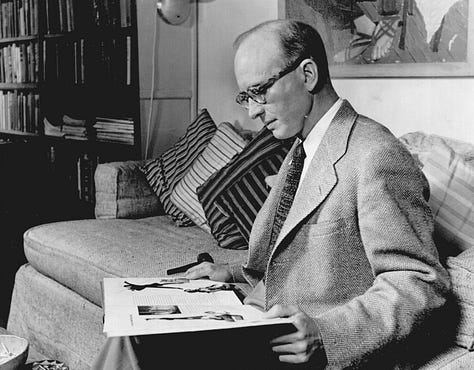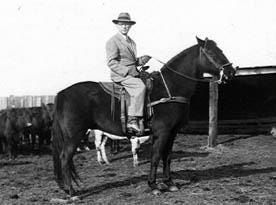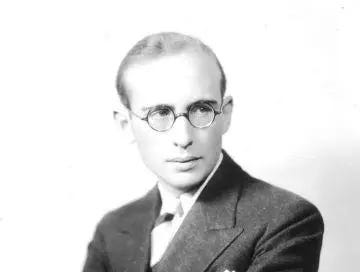I listened to the Bloomberg podcast “In Trust” and the most recent episode “The Oklahoma Haze,” produced by iHeart Radio and thought I should offer some insight into family history.
It’s not just any history…my relatives form the myth of the musical and are the roots and fabric of the place we know as the 46th state.
As I’ve gained age, I’ve lamented never using my film degree from Emerson for personal artistic pursuits…despite writing multiple scripts, short stories and treatments. I’ve never produced anything of a passion project or personal nature.
My father and I had been estranged for 14 years when he died on August 9, 2022. The last time I saw him in person was in August of 2008. The last time we spoke was that November by phone. This was a brief period of reconciliation…I had previously lovingly detached via an angry letter I mailed after a goodbye in Los Angeles…on Sunset Blvd., outside The Standard Hotel in September of 2000…
For the better part of my adult life, my father has been absent. I shielded my family from his special brand of chaos. He never met my wife or kids….
My father never shared anything about his family. The only story he ever told me happened when he was 15 years old, and it was prompted by my question, “what was your Stepdad like?”
“I came home from school one day to my stepfather hitting my mother. Something inside me snapped…I started hitting him and I beat him within an inch of his life on the front yard of our home. The police came and separated me from my mother and little brother, Dale. I was sent to the Oklahoma Military Academy in Claremore.”
My Uncle Dale shared his side of the story when I saw him last October.
“I was 7 or 8 years old. I remember a policeman told me I’d never see my father again. Mom and I went to live with Grandma Willie. A couple years later, or at least that’s what it seemed like, we were all together as a family again, in a different house. Your dad, the “chosen one,” was off at college by this point.”
That’s the sum total of family history shared in the 35 years my father was “actively” a part of my life.
What follows, I’ve only learned over the past four years…
My great-great grandmother was Mary Elizabeth Riggs Thompson Brice, aka Aunt Eller, one of the main characters in the Rodgers & Hammerstein musical “Oklahoma.” Her brother, William Grant Riggs, was Lynn’s father. Another sibling, (she had a total of 7), James Walker Riggs, owned the St. James Hotel in Claremore (he was also a banker, I believe). She ran the kitchen adjacent to the hotel and bore a total of 11 children with her first husband William, three of which died very young due to poor health and illness. Her “baby” child, Willie, was both my great-grandma and the basis for “Ado Annie,” the “woman who cain’t say no.”
Lynn based many of the characters in his plays on members of the Riggs and Thompson clans that surrounded the area where Lynn and Willie were born. What is now known as Claremore was known then as Sequoia Switch, Indian Territory. The “switch” is likely a railroad reference…
Lynn is 1/8 Cherokee. His birth mother died when he was very young. His stepmother beat him from a young age…which I would have known had I read the inscribed and autographed copy of “Haunted by Home” the biography Phyllis Cole Braunlich wrote that someone sent to me when I was in high school.
I didn’t know much more than “Lynn Riggs wrote Green Grow the Lilacs.” I didn’t know he was a cousin - that the characters were these women in my life. I was alerted to his Cherokee heritage and other information about my father’s side of the family through a distant cousin that found me on Ancestry.com.
In the fall of 2019, just before the pandemic started, I paid $900 to a professional genealogist to determine if my Great Grandma Willie was in fact a member of Cherokee nation. This was a rumor that had swirled around in our family, that I first heard when I was 7 or 8 years old.
A report came back, and sure enough, a William Thompson, was married to a Mahala, and they had eight children, one of which was Willie Reburta Thompson, listed on the Dawes Roll with the number 22855.
If Willie’s Mother is Mahala, then who is Mary?
My grandmother Willie’s maiden name is Thompson and her father’s name is William, that’s correct.
Willie’s date of birth on the Dawes Roll is 1896, with no month given; My grandmother Willie’s date of birth, as listed on her death certificate, is May 28, 1901. She has no birth certificate, as she was born prior to statehood…
An unscientific thought, but one that stands to some reason: what are the chances that there are two women, born within five years of one another, in the same general area of the country, Indian territory, with the same name, Willie Reburta Thompson, and both having a father with the same name, William Thompson?
The odds that I might have some form of Native American ancestry are more than say the average Caucasian living in Marblehead, MA, who appears as white as the next preppie wasp (alas, I’m a lapsed Catholic). I was curious, and I looked into the steps that would need to be taken to apply for citizenship to the Cherokee Nation. I decided “what he hell?” and submitted my application in person at the tribal headquarters in Tahlequah last October. I’m still waiting on a decision…
I have a cousin that was told, as many of us that have Oklahoma genealogy, (Senator Elizabeth Warren included), “there’s some Cherokee in our blood going back a couple generations.” He checked the box on his application to the University of Denver, only to be asked at registration for a tribal card, to which he looked back at the registrar dumbfounded, as he’d never been a registered tribal member. His mother has had a farm, from her side of the family, (160 acres) in Tahlequah going back to the 19th century and his dad added a couple hundred acres to their holdings in the last decade or so. His family aligns with Laura Clementine Thompson, aka “Laurey,” the main character in the musical.
More importantly, I think there is a reason why Lynn focused on and wrote about strong women, with the exception of the “slut-shaming” lens through which anyone would see Ado Annie’s characterization, then or now. Unless, of course, you see this as a woman having “agency.”
Why was my great-grandma slut-shamed? Well, maybe because her daughter Delores Fisher, my grandmother, was an illegitimate child. She gave birth to Delores at 19, and a much older man by the name of Charles Fisher is listed as the father, however, I know very little…hardly anything…about this man. No one in the family ever spoke of him.
Her other daughter, Mary, was born less than a year after my grandmother.
My Uncle, Dale Johnson, my dad’s half-brother, said Delores told him she was illegitimate when he was in his 20’s…
Dale said, “Chris, I think that’s what haunted your dad…”
Dale also told me a story about how when he went to see his Grandma Willie for some marriage advice when he was young and newly hitched. He went to her house at 1310 S. Urbana, which he still owns to this day, and asked, “Grandma, Michelle and I are having a rough time, what should I do?”
Willie replied, “Dale honey, you grab her by the pussy hair, throw her down and give it to her good, she’ll come around.”
Willie committed suicide on April 28, 1974 from an overdose of Tuinal at 1310 S. Urbana.
Recently, while doing research, I noticed a man named Arthur Woods pictured as a teenager with the Thompson and Riggs clans on the steps of the St. James Hotel from 1915. It’s a staff photo that has been distributed through the family and is also in the archives at the Claremore Museum of History.
After some more digging, it became clear that Arthur Woods was married to Margorie May “Doll” Thompson Woods…she died of TB…a year after her death, Art married Willie…
My dad’s father entered the Army in 1943. He was killed in action in Anzio on October 1, 1944. He was posthumously awarded a Purple Heart…apparently, the records of many service men and women were destroyed in a fire at the National Archives, which explains why there is limited information about Pvt. Willard Jennings service in WW II.
Soldiers bound for Europe were often sent through New York City. A main form of entertainment were musicals and other stage acts on Broadway, which were frequented by men in uniform. Imagine being Pvt. Willard, a native Oklahoman seeing “Oklahoma,” in big lights, ironically at the St. James theater, in March of 1943, but knowing that one of the main character’s is based on his mother-in-law being portrayed as a “slut.”
Was he ashamed? He probably knew Lynn: Lynn and Willie were like brother and sister, very close in age, and we know from Phyllis Cole Braunlich’s book, that Lynn sought refuge with his Aunt Mary because his stepmother was abusive.
Maybe Pvt. Jennings saw the musical on Broadway before he was sent into battle and killed in action? Imagine hearing these lyrics:
They couldn't pick a better time to start in life,
It ain't too early and it ain't too late.
Startin' as a farmer with a brand-new wife
Soon be livin' in a brand-new state!
Brand-new state
Gonna treat you great!
We know we belong to the land,
And the land we belong to is grand.
And when we say;
Ee-ee-ow! A-yip-i-o-ee-ay!
We're only sayin',
You're doin' fine, Oklahoma!
Oklahoma, O.K.!
A lead miner, with a three-year old son, doing his duty as an American…but also being part of the very “fabric” from which Rodgers and Hammerstein tapped into through Rigg’s play…except…they took out the real fabric that Riggs so eloquently wrote about.
Riggs wrote not just about the fabric. These men created the death from which they would either be shot or decades later, poisoned from. One way or another, the government would take their lives.
Many of the mines, including the Eagle Creek where Willard worked, produced the lead made into ammunition…the bullets. Bullets Pvt. Willard loaded into his own weapon.
Lead. The same mineral that ended his life on the beach outside of Rome, Italy.
Delores left Picher with my three-year old father in tow and moved to Tulsa into her mother’s rooming house on S. Victor. In hindsight, this was probably the best decision Delores, a switchboard operator, ever made…considering what was in store for the residents of Picher.
What manifested and grew from this situation was my father, described by my therapist Dr. David Danforth in 2006 as a “narcissistic sociopath with pathological tendencies.”
It’s rumored that Lynn paid tuition for my father to various schools and helped Willie and Delores financially. Lynn also helped other members of the Riggs and Thompson clans.
What no one knows about is that Lynn left a lit cigarette in an ashtray in his Aunt’s kitchen that burned down her whole house while he was home visiting from college, sometime in the 1920’s. My great grandma had to start all over. She lost everything, very late in life. Lynn’s “drive" was, in-part, to right the wrong of destroying his Aunt’s home, the woman who gave him refuge and love.
My father was a talented athlete and did very well in school. He was tested and reported to have an IQ of 140. Lynn wanted to bring my father to New York and raise him, but more importantly, to put him into a private school, and remove him from his violent home life.
Willie and Delores said “absolutely not,” and it was no secret that this was due to Riggs being gay. My father was thirteen when Lynn died.
This also explains my father’s life long homophobia, something even my mother, who divorced my father after 27 years of marriage in 1989, never understood. My dad was a liberal person, however, he did not vote until very late in life. His homophobia was the only aspect of his “views” that conflicted with his political stance, which was classically liberal.
A young boy, who’s father dies in the war…who’s grandma is known to everyone as a “wild woman,” and was refused the offered guidance of a successful, financially well-off, male role-model due to his sexuality.







